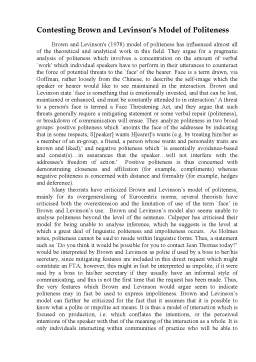Cuprins
- Introduction
- Feminist Linguists and Communities of Practice
- Theorizing of Power
- Contesting Brown and Levinson’s Model of Politeness
- Impoliteness
- Conclusions
- Bibliography
Extras din referat
Introduction
In this report we aim to bring together new theoretical work on gender from feminist linguistics with new theorizing of linguistic politeness. We’ll try to clear some theoretical space for thinking about both the terms gender and politeness, and thus much of the paper is given over to a critique of theorizing on this subject. We need a more flexible and complex model of gender and politeness. Theorists in gender and language research cannot continue to discuss gender simply in terms of the differential linguistic behavior of males and females as groups; we need to be able to analyze the various strategies which gendered, raced and classed women and men adopt in particular circumstances and with particular goals and interests. In terms of the analysis of politeness, we would argue that we need several analytical changes: firstly, we need to see politeness as occurring over longer-stretches of talk; secondly, it should be seen within the context of a community of practice, rather than as simply as the product of individual speakers, and finally, we need to be aware that there may be conflicts over the meanings of politeness. We will try to formulate the ways in which the theorizing of gender and politeness might proceed, and in particular focus on the way that impoliteness is dealt with in interactional terms. A more pragmatic focus on impoliteness enables us to view politeness less as an addition to a conversation, something which is grafted on to individual speech acts in order to facilitate interaction between speaker and hearer, (which is at least implicit in Brown and Levinson's 1978 model) but rather as something which emerges at a discourse level, over stretches of talk and across communities of speakers and hearers. This, therefore, constitutes a discourse analysis of politeness, rather than a linguistic analysis of politeness. Thus, rather than identifying the Face Threatening Acts performed by individuals and the politeness repair work deemed necessary to contain their force, as Brown and Levinson (1978) have done, will be focusing instead on the effect of impoliteness on groups and the way that gender plays a role in assumptions about who can be impolite to whom, and who needs to repair the damage. It will suggested that, using Relevance theory to examine the way that male and female interact ants make sense of an event in speech, we may be able to see gendered protocols at work. In viewing a range of different interactions we can analyze the different strategies adopted by various women rather than attempting to make generalizations about the way that all women respond to rudeness or are themselves impolite. In this way, we can map out parameters for strategic intervention to repair interaction and suggest ways in which they may be contextually gendered, without making assumptions about the necessary pairing of language items with a specific gender.
Feminist Linguists and Communities of Practice
Gender has begun to be theorized in more productive ways, moving away from a reliance on binary oppositions and global statements about the behavior of all men and all women, to more nuanced and mitigated statements about certain groups of women or men in particular circumstances, who negotiate within certain parameters of permissible or socially sanctioned behavior. Rather than seeing gender as a possession or set of behaviors which is imposed upon the individual by society, as many essentialist theorists have done so far, many feminists have now moved to a position where they view gender as something which is enacted or performed, and thus as a potential site of struggle over perceived restrictions in roles. Of particular interest is the notion of communities of practice, developed by Wenger, and developed in relation to language and gender research by Eckert and McConnell-Ginet to particular effect. Within this view, feminist linguistics should be concerned less with analyzing individual linguistic acts between individual (gendered) speakers than with the analysis of a community based perspective on gender and linguistic performance, which in the case of politeness must therefore involve a sense of politeness having different functions and meanings for different groups of people. ` A community of practice is an aggregate of people who come together around mutual engagement in some common endeavor. Ways of doing, ways of talking, beliefs, values, power relations – in short, practices – emerge in the course of their joint activity around that endeavor.’ The crucial dimensions of a community of practice are that it will have `mutual engagement; a joint negotiated enterprise; and a shared repertoire of negotiable resources accumulated over time.' Thus, each community will develop a range of linguistic behaviors which function in slightly different ways to other communities of practice. However, we need to modify this notion of community of practice slightly, since although there may be broad agreement as to the norms operating within that group, there will also be different `takes’ on those norms, and gender may play a significant role here in determining what each participant views as appropriate. If we are concerned with analyzing cross-cultural differences in language use, the issue of gender is even more fraught, since what we refer to as gender or sex difference varies within and between cultural contexts. What is deemed appropriate linguistic behavior for a working class white heterosexual English woman in conversation with a group of her peers will not be the same as what is deemed appropriate for a middle class Chinese heterosexual woman conversing with her peers.
Preview document
Conținut arhivă zip
- Politeness and Gender.doc











